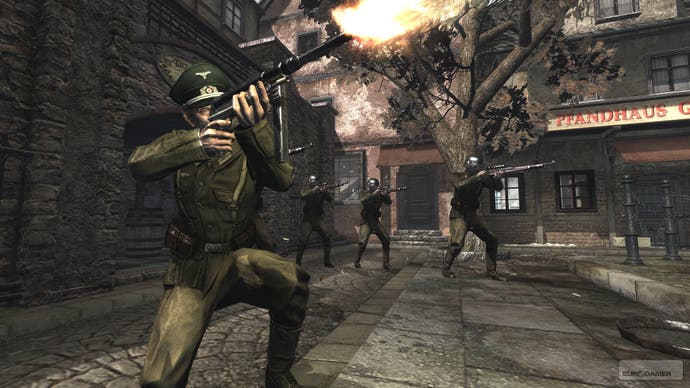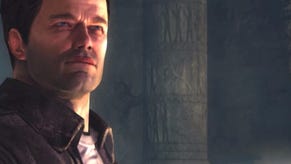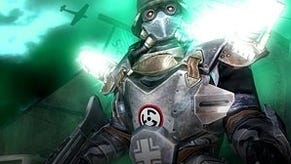Wolfenstein
Two wrongs don't make a Reich.
Can we appreciate games ironically yet? You know, like how people will say a film is "so bad, it's good", or how people (well, students mostly) will dance to a rubbish pop song, precisely because of its naffness.
That's the feeling that the 2009 model of Wolfenstein evokes. A belated series reboot, arriving the best part of a decade after the rather good 2001 Xbox outing, Return to Castle Wolfenstein, it's a wonky, glitchy and often idiotic game. It's also occasionally amusing - certainly more than a game with this many issues should be - but I often can't tell if I'm laughing with the game, or at it.
Once more, you step into the sweaty combat boots of BJ Blazkowicz. You're summoned to the German town of Isenstadt, where your talents have been requested by the local resistance. The Nazis are doing something peculiar at a nearby archaeological dig, and it involves something called Black Sun energy. Long story short, they've found a hellish alternate dimension called The Veil and are siphoning its power to help create yet more supernatural ubermensch.
It's a Wolfenstein game, so of course that's what they're doing, but the game still uses too much plodding dialogue and exposition to establish something that every player already knows before they've even taken the disc out of the case. You're left wishing it would just cut to the chase, and make with the Nazi monsters, but efficiency sadly isn't this game's best feature.
Rather than leading you through the levels in linear fashion, you must explore the town and find the people who give you missions. It's the sort of approach that can work well in a shooter with role-playing tendencies, like S.T.A.L.K.E.R, but here it just feels like pointless padding.
The town is a small and muddled maze of streets, alleys, rooftops and sewers, and it's also stuffed full of enemies. This means that you can complete a mission, and still have to slog through standoffs with dozens of soldiers just to report back to an NPC and tell them you've completed the mission. You can avoid some interruptions by heading underground, but the game still finds ways to bog you down in random encounters regardless of what you do. Despite the bullets flying, these battles never feel like meaningful action, more a purposeless grind.

Even more galling, by contrast the missions themselves take place in distinct separate areas and are linear to a fault. A farm, a factory, a hospital - you'll blast your way through all of these, but progress is never more taxing than following the dot on your compass. In fact, most of the time you don't need to know where you're going or why, so effective is this navigational tool.
You don't even need to use the map. Just follow the dot, kill everything in your path, and you'll reach the end regardless. Along the way you can keep your eyes open for intelligence documents, magical books and gold to unlock and purchase upgrades for your weapons. Rummaging around in corners for trinkets is the closest the game comes to variety, but it's a thankless and largely redundant task trying to find everything. You can easily get by with the stuff you find lying in plain sight, so you soon stop bothering.
There's nothing inherently wrong with such ruthless focus on the joys of a good old-fashioned gib-fest, of course, and Wolfenstein's combat mechanics are adequate for the rudimentary nature of the game. Targeting is solid, though the aiming speed feels a touch slow, and both the period and fantasy weaponry feels satisfying. Grenades and rockets explode with tangible force, and there's enough physics to the gameworld to add some spice to otherwise ordinary firefights.
There's a sense that interesting angles are being dangled and then forgotten though. The opening level sees a train station ripped apart by Black Sun energy, sending objects and people levitating into the air. It's a cool set-piece, but having enticed you with the notion, the idea of floating combat is then ditched. Ditto for any squad play. Sometimes you're accompanied by NPC soldiers, but they tend to vanish for no apparent reason and are never under your control.
In terms of the basics, movement feels gluey and prone to snags. This is particularly noticeable in the boss fights, where the ability to nimbly dodge and attack a rushing behemoth is vital. The sprint move is slippery, assigned as it is to a press of the left stick, and BJ's tendency to be stopped in his tracks by debris or furniture makes back-pedalling and strafing a hit and miss prospect.
You also get a quartet of Veil powers, unlocked in the first half of the game by retrieving crystals from Nazi strongholds. Once again, however, it feels like half an idea, implemented with a shrug. The most basic form of Veil power lets you see the world through a greeny-blue supernatural fog. Secret doorways and ladders (not so secretly marked with special markers) can be accessed, and enemies are highlighted.




